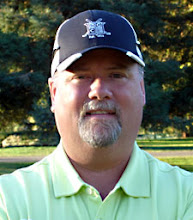Friday, January 8, 2010
More purple grass
Here is a closeup of the pigment condition I described in the last post. I pulled this one off of the University of Connecticut Turfgrass Disease website by following a link supplied by one of our followers, John Kaminski, Ph.D.
http://en.wikipedia.org/wiki/Anthocyanin
http://books.google.com/books?id=N7HoRiWxG2kC&pg=PA29&lpg=PA29&dq=anthocyanin+bentgrass&source=bl&ots=cAWm--MX15&sig=MkYaEJ5cU6OP4ZaAqVsS2B0Ph1w&hl=en&ei=6ahHS-WuG4SkswPr_t31Dw&sa=X&oi=book_result&ct=result&resnum=1&ved=0CAkQ6AEwAA#v=onepage&q=anthocyanin%20bentgrass&f=false
Happy reading.
 Notice the purple tips on most blades of grass. This is an accumulation of anthocyanin due to cold temperatures that limits translocation of sugars produced during photosynthesis.
Notice the purple tips on most blades of grass. This is an accumulation of anthocyanin due to cold temperatures that limits translocation of sugars produced during photosynthesis.
Wow, I have become a real nerd because I find this stuff fascinating. If you are also intrigued by this seasonal abnormality, then here is a few links that will dive a little deeper into this subject.
The first link is from Wikipedia, always a good place to start. The second is a Google preview of a great book by Peter Dernoeden called Creeping Bentgrass Management.http://en.wikipedia.org/wiki/Anthocyanin
http://books.google.com/books?id=N7HoRiWxG2kC&pg=PA29&lpg=PA29&dq=anthocyanin+bentgrass&source=bl&ots=cAWm--MX15&sig=MkYaEJ5cU6OP4ZaAqVsS2B0Ph1w&hl=en&ei=6ahHS-WuG4SkswPr_t31Dw&sa=X&oi=book_result&ct=result&resnum=1&ved=0CAkQ6AEwAA#v=onepage&q=anthocyanin%20bentgrass&f=false
Happy reading.
Subscribe to:
Post Comments (Atom)


0 comments:
Post a Comment